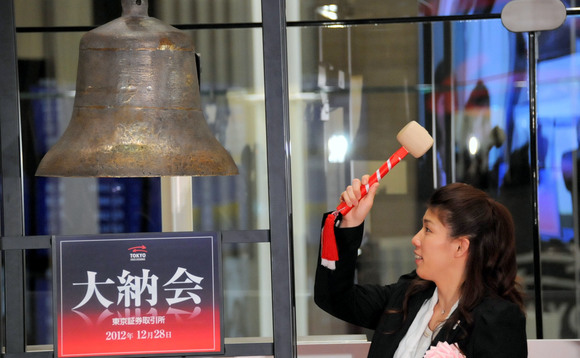
Japan IPOs: Rising sun

On the back of a cautious economic recovery Japan witnessed a boom in IPOs in 2013 as a host of venture capital-backed companies went public. How long will the good times last?
When the opening bell rang on the Tokyo Stock Exchange on December 11, online real estate information portal O-uccino and software developer Encourage Technologies became two of the last VC-backed firms to go public in the most active period for Japanese IPOs in five years.
The two listings came on the heels of a flurry of VC-backed offerings which started with Jafco-invested online marketing firm ANAP listing on JASDAQ on November 22. It was followed by nine more offerings on the MOTHERS (market of the high-growth and emerging stocks) section of the Tokyo Stock Exchange (TSE).
According AVCJ Research, this four-week period alone saw more VC-backed companies go public than in the whole of 2009.
"We began to see signs of recovery in the IPO market in the second half of 2012," says Kengo Ueha, head of investor relations at Jafco, which saw 21 portfolio investments go public last year. "As we moved into 2013, individual investors started to aggressively participate alongside institutional investors and that is big part of why it has been such an active market."
The recent surge in IPOs is part of broader story of economic revival in Japan. How significant that change is and how long it lasts will be a defining issue for the country's business and investment community in 2014.
Strong starts
A total of 36 PE and VC-backed IPOs raised $1.38 billion in 2013, the most since 2006 if you discount the $8.5 billion listing of Japan Airlines in 2012 and the $ 1.2 billion TSE IPO of Korean online gaming company Nexon Corp. in 2011.
While 2013 saw some sizeable PE-backed IPOs - notably Carlyle Group's JPY24.4 billion ($253 million) exit of software firm Broadleaf in May, its second in the country in as many years - the year was largely characterized by small VC-backed debuts, with 22 listing on the small-cap MOTHERS section. And nearly all have performed strongly post-IPO.
"Interest in IPOs over the past 12 months has been represented by the fact that a high number of companies have well traded above their offering price," says Joji Takeuchi, CEO of PE advisory firm Brightrust. "In 2013 about a half of the shares newly listed on the TSE traded more than double the offering price at listing".
Examples of this can be seen on both ends of the scale. Broadleaf closed at JPY1,933 on January 7, an 80% premium to the original offering price. Meanwhile, ReproCell - a bio technology firm backed by VCs including SBI Investment, DBJ Capital, Jafco, Mitsubishi UFJ and Nissay Capital - has seen its share price increase nearly five-fold since the company's $49 million IPO in June.
Strong investor demand for Japanese equities can to a large extent be put down to the economic policies of Japanese Prime Minister Shinzo Abe, which comprise of "three arrows" of fiscal stimulus, monetary easing and structural economic reform. So far the main effect has been a boost in investor sentiment.
"Abenomics was a strong tail wind," says Shinchi Takamiya, a partner with Globis Capital Partners, adding that between November 2012 - just before Abe assumed office - and November 2013, the Nikkei stock average increased 1.7x. "It is the third arrow we are now focusing on to lift up the fundamentals of the economy."
More recently, the government has been looking at other policies to support companies looking to go public. Last month, a panel assembled to examine ways to stimulate capital markets published its recommendations. These included providing start-ups with better access to risk capital and easing burdensome requirements for new listings.
At the same time, many investors observe that Japan's IPO market has also benefited from a improvement in the quality of companies looking to go public. Globis' Takamiya draws an important contrast between the class of 2013 and those that listed during previous boom periods.
"Looking at the micro level, more companies listing today have very solid revenues and margins compared to the internet bubble era," he says. "In general most companies have already found profit before they list."
Exit alternatives
The performance of newly listed companies has inevitably made IPO exits a more attractive proposition. Brightrust's Takeuchi notes that a corporate buyer many have once offered a higher price for a business but that this not necessarily the case now. "The IPO market has started to give somewhat better multiples so probably the gap between a strategic sale and an IPO has been narrowing," he says.
But how long can it be sustained? Jafco was perhaps biggest winner of 2013, with four portfolio companies - including ReproCell - going public in the first half of the year at a total market value at IPO of JPY21.1 billion, representing a multiple of 24.1x, far above the firm's typical 5x target. While Ueha remains upbeat, expecting as many as 12-16 of Jafco's portoflio investments to go public in 2014, he observes that moderation is inevitable.
The same cautious optimism is echoed by Globis' Takamiya. "We will have the rise in consumption tax in April and that will affect the market but it will not cause a huge crash, if anything we might have a stable plateau," he says. "Unless there is some external crisis, there is no short term reason why the overall investor sentiment should change.
Latest News
Asian GPs slow implementation of ESG policies - survey
Asia-based private equity firms are assigning more dedicated resources to environment, social, and governance (ESG) programmes, but policy changes have slowed in the past 12 months, in part due to concerns raised internally and by LPs, according to a...
Singapore fintech start-up LXA gets $10m seed round
New Enterprise Associates (NEA) has led a USD 10m seed round for Singapore’s LXA, a financial technology start-up launched by a former Asia senior executive at The Blackstone Group.
India's InCred announces $60m round, claims unicorn status
Indian non-bank lender InCred Financial Services said it has received INR 5bn (USD 60m) at a valuation of at least USD 1bn from unnamed investors including “a global private equity fund.”
Insight leads $50m round for Australia's Roller
Insight Partners has led a USD 50m round for Australia’s Roller, a venue management software provider specializing in family fun parks.







